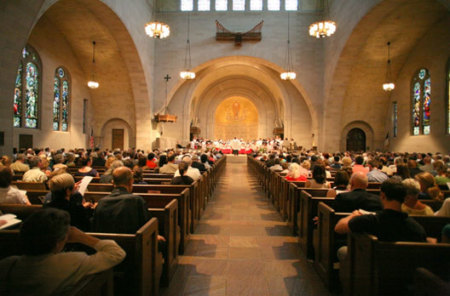The Presbyterian Church adds ‘Per Capita Sunday’ to official calendar to explain funding system

The Presbyterian Church (USA) has added an observance called “Per Capita Sunday” to its calendar in the hopes of fosteringa better understanding of its funding systemamong congregations.
Being the largest Presbyterian denomination in the United States, it announced that the first Per Capita Sunday will be held on Jan. 23.
“Per capita” is the term that PCUSA uses to describe the system by which the internal functioning of the denomination is funded, such as its agencies and the Office of General Assembly.
Kate Duffert of the PCUSA Office of the General Assembly told The Christian Post that the observance was created to help members realize the theological significance of the funding system.
“Over the past few years, staff and volunteers in the PCUSA have noticed our conversation around per capita has been centered in the practicality of what per capita funds and the methods through which it is collected,” said Duffert.
“However, per capita is rooted in a set of theological values and principles — that all are called to participate in the church, that congregations are called to join together in mission, that we believe in creating meeting spaces that include the voices of many in decision making, and that we need one another to hold ourselves accountable.”
Duffert explained that the creation of Per Capita Sunday “allowed for the creation of more materials that enable congregations to explore this call during worship.”
William McConnell, the mission engagement adviser with the PCUSA Presbyterian Mission Agency, sees the observance as “an effort to clear up confusion about what ‘per capita’ is and what it is not.”
McConnell views it as “a good way to share information and to address questions about this system” as well as “an effort to lift up the deeply theological concept of shared responsibility and support for those things that the church does together.”
Jan. 23 was selected for the first Per Capita Sunday because it's around the time many congregations are finalizing their annual budgets. It also falls on the day in the Revised Common Lectionary that centers on the 1 Corinthians 12 passage about the Church being “one body” but “many parts.”
“This seemed to be a strong scriptural corollary to the connectional aspects of ‘per capita,’” noted McConnell, adding that PCUSA had not yet selected a date for next year’s Per Capita Sunday.
Per capita traces its origins to the 18th century, when the pre-PCUSA Presbyterian Church created a fund meant to cover the expenses of commissioners traveling to Philadelphia, Pennsylvania, for their first General Assembly gathering.
For the observance later this month, the mainline Protestant denomination has created multiple resources, including a liturgical text that can be used for worship.
“We hope that congregations will take this opportunity to dive into conversation about per capita — whatever that may mean for them,” explained Duffert. “For some, it may be a chance to affirm their existing commitment to per capita. For others, it may be a newer discussion that comes with more exploration.”
“While there is no mandate to observe Per Capita Sunday in any way, we are hopeful that congregations find these resources and the possibility of this set-aside time as helpful ways to discuss the importance of per capita to the PCUSA.”
Per Capita Sunday comes as the PCUSA is looking to curb expenses due to financial woes linked to its considerable years-long decline in congregations and members.
Last May, for example, the denomination released its annual book of statistics in a digital format only, with PCUSA Stated Clerk, the Rev. J. Herbert Nelson II, saying that this was partly in response to a decline in revenue.
“For one, it costs approximately $25,000 to produce 2,000 copies of this book. Secondly, it can quickly become outdated as things change throughout the church,” said Nelson last year.
“I have said many times over the past year that we need to be moving the church forward in the 21st century. … But economics have also prompted us to make smarter decisions on how per capita dollars are spent. We find this to be more efficient and timelier, giving Presbyterian leaders the information they need in real time.”





















